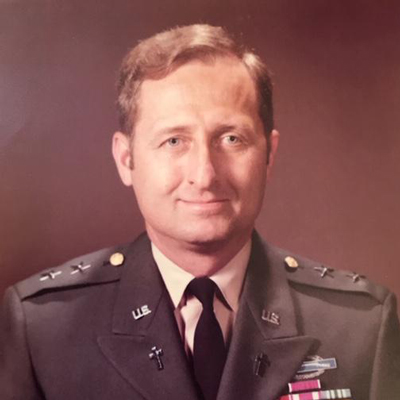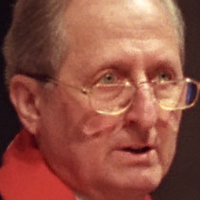Johnson, who once served the PC(USA)’s Washington office, died Jan. 9 at age 91
by Mike Ferguson | Presbyterian News Service

Chaplain (Major General) Kermit D. Johnson was the Army’s 15th Chief of Chaplains. For two years following his military retirement, he served in the PC(USA)’s Office of Public Witness. (Contributed photo)
LOUISVILLE — Major General Kermit D. Johnson, the Army’s former Chief of Chaplains who served for two years at the Presbyterian Church (U.S.A.)’s Office of Public Witness, is being remembered by the United States Army Chaplain Corps Regimental Association following his Jan. 9 death at age 91.
According to his remembrance, Johnson read the book “West Point Today” as a high school sophomore and began dreaming of attending the United States Military Academy. While studying there he was an average student who took up squash after injuring himself boxing. By his senior year he was Army’s top squash player and ranked sixth in the nation.
Also while studying at West Point he read the Bible and committed his life to Jesus Christ. Upon graduation he was commissioned a second lieutenant in the infantry. He took jump training followed by a short stint in the 82nd Airborne Division. It was at Fort Bragg, North Carolina, that he told his wife Lynn, “There’s one thing I will never be and that’s an Army chaplain.”
He commanded two heavy mortar companies, one in the Korean War and the other on the island of Okinawa.
He resigned from active duty in 1954 but retained a commission in the Army Reserve. After leaving the Army, he and Lynn served as lay missionaries for three years. He then entered Princeton Theological Seminary, completing his studies in 1960 and becoming ordained as a pastor in the PC(USA). Immediately he went back into the Army as a chaplain and realized he was “back home.”
Then followed a wide-ranging career in the Army chaplaincy including two tours with the Third Armored Division in Germany; preaching posts at Mark Twain Village and Patrick Henry Village Chapels in Heidelberg, Germany; adviser to the Vietnamese Armed Forces Chief of Chaplains; post chaplain positions at West Point and Carlisle Barracks, Pennsylvania; graduation from the U.S. Army Command and General Staff College and in 1976 the U.S. Army War College; U.S. Army forces Command Chaplain, Deputy Chief of Chaplains and Chief of Chaplains, the 15th in Army history, from 1979 to 1982.

Princeton Theological Seminary named Johnson its Distinguished Alumnus in 2013. (Contributed photo)
In 2013, Princeton Theological Seminary invited him to speak as the Distinguished Alumnus. In 2015, he was nominated by his peers and recognized at the U.S. Army War College as an Outstanding Alumnus.
After retirement from the Army, Johnson served from 1983-1986 as associate director of the Center for Defense Information in Washington, D.C. Subsequently he served for two years in the PC(USA)’s Washington Office and was a member of the Central America working group.
Over the years he authored articles and individual chapters in books on military ethics, nuclear issues and just war. His book “Realism and Hope in a Nuclear Age” was published by Westminster John Knox Press in 1988. In 1997, the University Press in America published his book on the moral issues of U.S. involvement in counter-revolutionary warfare, “Ethics and Counterrevolution: American Involvement in Internal Wars.”
Kermit and Lynn Johnson retired in northern Virginia, lived for a time near Rehoboth Beach, Delaware, and then moved to Harrisonburg, Virginia. More recently they moved back home to Minnesota to be close to their daughter, grandchildren, and great grandchildren.
Johnson applied the gospel of Jesus Christ to real-world issues. He had a wholistic understanding of the gospel that applied to all of life. He never abandoned the evangelical claims of the gospel and his theology could be summarized in one word, “grace,” God’s unmerited favor, God’s love and of forgiveness for unworthy persons such as himself. The capstone of this gospel he held to be the stupendous reality of the resurrection and the hope of eternal life through Jesus Christ. This is what he wished to be his “last word” to the love of his life, Lynn, to his daughter Karin, son Chris, his nieces, nephews, grandchildren, great grandchildren, classmates, and friends.
He died the morning of Jan. 9 in a Minnesota hospital after having put up a good fight. He will be interred in Arlington National Cemetery in Arlington, Virginia.
![]() You may freely reuse and distribute this article in its entirety for non-commercial purposes in any medium. Please include author attribution, photography credits, and a link to the original article. This work is licensed under a Creative Commons Attribution-NonCommercial-NoDeratives 4.0 International License.
You may freely reuse and distribute this article in its entirety for non-commercial purposes in any medium. Please include author attribution, photography credits, and a link to the original article. This work is licensed under a Creative Commons Attribution-NonCommercial-NoDeratives 4.0 International License.